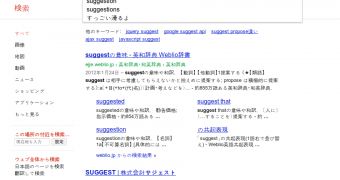Google Japan has been ordered to remove certain suggestions in Japan, according to several reports in the country. The Tokyo District Court has ruled that Google must block the feature in the country since it violates user privacy.
The decision comes after a complaint by a Japanese man, who has been unnamed, in which he argued that Google is violating his privacy by suggesting search terms related to criminal acts along with his name. He says he is unfamiliar with any of acts.
It seems that only one suggestion is at fault and searching for the suggested terms retrieves 10,000 results which are "defaming" the man.
He asked Google to remove the suggestion that the company, unsurprisingly, refused. He believes the terms caused him to lose his job a few years ago and for other companies to refuse to hire him since.
Google is said to be refusing to remove the feature, saying that, as a US company, it does not have to follow Japan laws.
There are several problems with the decision, some quite obvious. As has been argued plenty of times, suggestions are automated.
A lot of people have to be searching for those particular terms for them to show up in suggestions. So if a lot of people are already searching for them, removing the suggestion won't fix much.
It's hard to frame suggestions as a privacy issue as well, they can't reveal anything that isn't already public knowledge, since people are already searching for it.
Further, it's hard to imagine what kind of company does a Google search for a current or potential employee, finds his name, but not necessarily him, unless he's the only one in the world by that name, associated with some criminal acts and decides to fire or not hire him without any other investigation.
The suggestion feature still works on Google Japan and it is very likely that Google is refusing to remove it.
But it is very unlikely that it would claim that it's not under Japan jurisdiction and doesn't have to obey Japan law, if only because the last thing it wants is to appear arrogant to the court. And, of course, Google has a local subsidiary which is very much under Japan law.
UPDATE: It seems that the court only targeted the specific suggestions, not the entire feature, and made a provisional decision. Google has said that it's reviewing the decision but has not taken any action yet.

 14 DAY TRIAL //
14 DAY TRIAL //